Clint Lalonde is one of our resident educational technologists and advocates for the use of open educational resources and open education practices in higher education. His official title is Manager, Open Education. He is a project lead on the BC Open Textbook project.

1. Can you tell us a bit more about Pressbooks and the Open Textbook Project at BCcampus?
PressBooks is an open source textbook author tool that we are using to create and modify open textbooks for the BC Open textbook collection. It gives BCcampus the ability to create a textbook and publish in a number of different formats, be it a website, an ePub document, or a PDF document. PressBooks allows us to create content once and then publish in a number of different formats.
This gives students who use these textbooks the option of how they want to use these books. It’s about personal choice and options. The format, content and version remain the same.
Because PressBooks is built on top of the WordPress content management system, BCcampus can take advantage of some of the other tools and functionality being developed by the open source community.
2. You are putting together an Open Textbook Sprint as part of Phase 3 of the Call for Open Textbooks. What’s involved in planning such an event? When will it take place?
I am so excited about our upcoming textbook sprint taking place from June 9 -12 at the University of British Columbia. We’re gathering geography faculty from across B.C. And, over the course of 4 days, we’re going to create a first-year geography textbook.
It’s a really innovative way to author books and the model has been very successful in places like Utah, Finland and South Africa. Textbook sprints are modelled after code sprints from the open source software development world.
We’re going to create an isolated and contained camp-like environment so that we can focus on creating a textbook in such a shortened time frame. It’s the first time we’ve done anything like this; and, we’re really hoping it might be a model for collaborative open textbook authoring in the future.
3. What is the OER Research Hub in the United Kingdom? How will BCcampus benefit?
The OER Research Hub is an international research project looking at the impact of open educational resources (OER), including open textbooks. The OER Research Project team is collaborating with BCcampus to undertake research on our open textbook project and testing a number of hypotheses.
Our B.C. post-secondary educators will benefit by having access to empirical evidence that will help inform adoption and use of open educational resources in the future.
Because the OER Research Hub is a global project, our data will be added to similar data from other jurisdictions. Our research will contribute to a global snapshot on the state of open educational resources, their use and effectiveness.
4. BCcampus is hosting its annual Open Textbook Summit in mid-April. Why is the conference important to the open-education community?
The Open Textbook Summit is an opportunity for us to connect with other people around the world doing similar work. There are a number of projects happening which are similar to our BC open textbook project.
The open education community is built on collaboration and sharing. The summit is a great opportunity for a number of projects to learn from each other, share resources and best practices.
The summit brings together leaders in the Open Textbook field, faculty who are reviewing, adopting and developing Open Textbooks, student advocates, librarians, institutional administrators, government officials, and policy staff.
It provides a unique opportunity for different stakeholder groups to be in the same room talking about the same issues.
5. If our readers want to learn more about OER research, open textbooks and educational technology what resources and which people do you recommend?
David Wiley is really one of the leading voices in the open education movement and has been for many years. His blog Iterating Toward Openness is one that I follow closely.
Martin Weller is involved with the OER Research Hub project and authors another blog: the Ed Techie that I read regularly.
The work that Una Daly does with the Community College Consortium for OER is fantastic, and they put on some great webinars.
In BC we have some excellent advocates for open education including Dr. George Veletsianos at Royal Roads University, Brian Lamb at Thompson Rivers University and Will Engle at UBC.
Will and Brian have been leading the development of the BC Open Education Community and are organizing Open Ed chats (which are archived). The BC Open Education community is a good place for educators to connect with others interested in open education.
Notable Quotes:
PressBooks is an open source textbook author tool that we are using to create and modify open textbooks for the BC Open textbook collection. It gives BCcampus the ability to create a textbook and publish in a number of different formats, be it a website, an ePub document, or a PDF document.
Because the OER Research Hub is a global project, our data will be added to similar data from other jurisdictions. Our research will contribute to a global snapshot on the state of open educational resources, its use and effectiveness.
The open education community is built on collaboration and sharing. The summit is a great opportunity for a number of projects to learn from each other, share resources and best practices.
